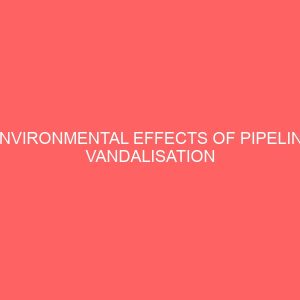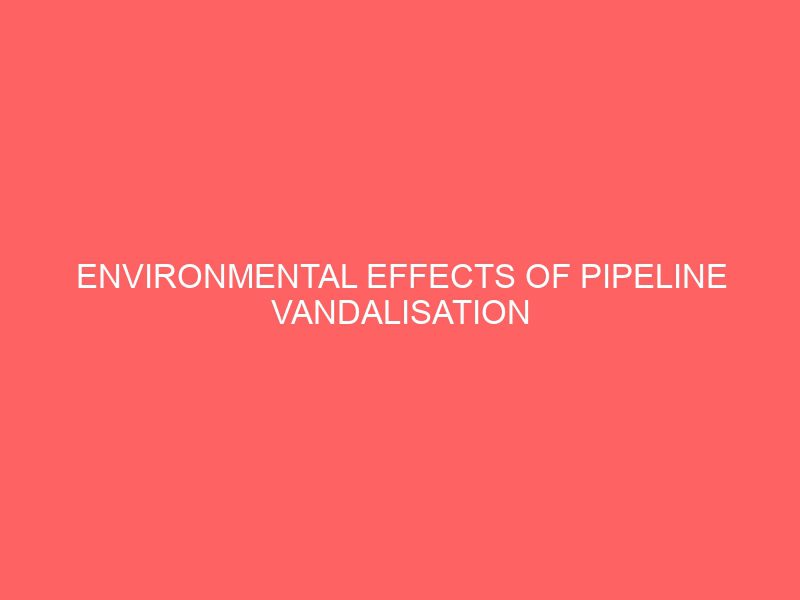Description
ABSTRACT
With the discovery of crude oil and natural gas ONG in the Niger Delta in 1956, it was expected that it will usher in the much needed sustainable development in the region. Whereas this did not happen, the activities of the multinational oil companies MNOCs operating in the region continued to pollute and degrade the environment so much that it disarticulated the local economy of the people. The unmet expectations coupled with the environmental degradation created frustration that consequently led the people, particularly the youths to vandalize oil pipelines. This paper examined the effects, as well as the causes and manifestations of oil pipeline vandalization in the region and country. The paper went further to discuss three celebrated cases on pipeline vandalization to show its consequences on the local people, and national economy and security. It also points out several lessons and recommends the involvement of the host communities into the oil economy for them to guarantee the safety of oil installations in the country.
INTRODUCTION
Since the discovery of crude oil and natural gas ONG in the Niger Delta Region in 1956, the socioeconomic and political well being of the people of the region has deteriorated. This is due mainly to environmental degradation caused by unregulated and abusive ONG exploration and production activities coupled with persistent political corruption which have contributed to endemic poverty and unmet development objectives. In the absence of jobs and sustainable development, criminal and political violent activities in the Niger Delta have steadily increased. Given the proximity and accessibility of the regions energy infrastructure to inhabitants, oil pipeline vandalism and illegal bunkering has become a key issue that has played a role in fuelling criminality and conflict, caused population displacement, and encouraged the social disintegration of communities.
The process of oil and natural gas ONG exploration, extraction, and transportation often impinge on the lives of the people and their environment, the negative effects are usually taken for granted by the Multinational Oil Companies MNOCs and the federal government until there is protests. The protests are then suppressed through obnoxious laws. This frustrates the people and makes them intensify the level of their protests, and eventually vandalize the pipelines conveying the crude oil. Ayida likens this vicious cycle to the rise and fall of Nigeria. To Ibaba and Olumati, the vicious cycle is perpetrated that the activity is carried out by individuals, and not communities, and the economic motive is central in their actions. They emphasized that, while serving a social purpose in terms of protesting against deprivation, the economic gains from vandalization is paramount in the minds of the actors. Arguing in the same vein, Okoko contends that those who support pipeline vandalization feel justified in line with the national syndrome of national cakesharing, besides the prevailing feeling of discontent occasioned by neglect and deprivation. Be that as it may, the act is perpetrated by few persons, commonly known as militants, but the entire community becomes victim in one form or the other. While pipeline vandalism and illegal bunkering have been featured in the literature on the Niger Delta, the various phases, causes, end effects are less understood.
This raises the question this study attempts to address; namely: what factors are responsible for oil pipeline vandalization Who are the major actors, causes, and manifestations What are the effects of vandalization on fueling energy and security crisis in the country What are the frameworks to address and manage the consequences associated with oil pipeline vandalization Thus, this paper aims to fill this gap by examining the social, economic and political effects of oil pipelines vandalization and in doing so, it will buttress the various phases and consequences of pipeline vandalization over the years with celebrated case studies. This paper begins by providing a brief overview of key definitions and the analytical approach. Following this, we will delve into the discussion on pipeline vandalization and distinguish the key phases and consequences for the host communities and other stakeholders. It concludes by obliging the MNOCs and the federal government integrating the local communities into the oil economy, and recommends the oil producing communities to fashion out a framework to manage the 13 percent derivation fund as against the present situation where the Niger Delta state governments control it. In this paper, we shall deliberately avoid detailed discussions on the demand for resource control and management, assessment of federal governments interventionist agencies, as well as hostage taking and kidnapping, all of which have been adequately discussed in several other fora in Nigeria. Now, let us turn to the conceptual framework, beginning with definitions.








Reviews
There are no reviews yet.